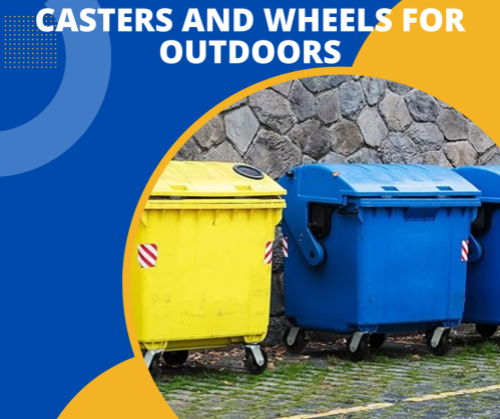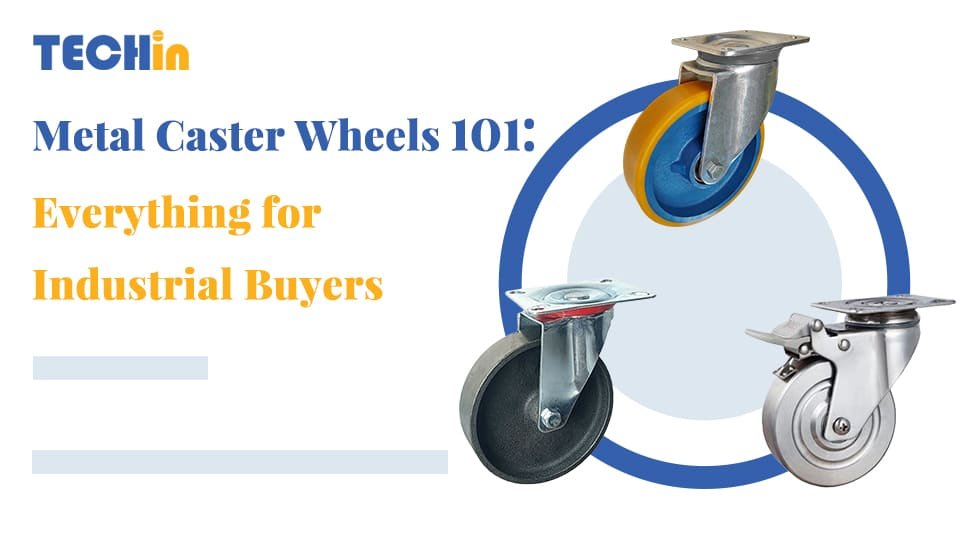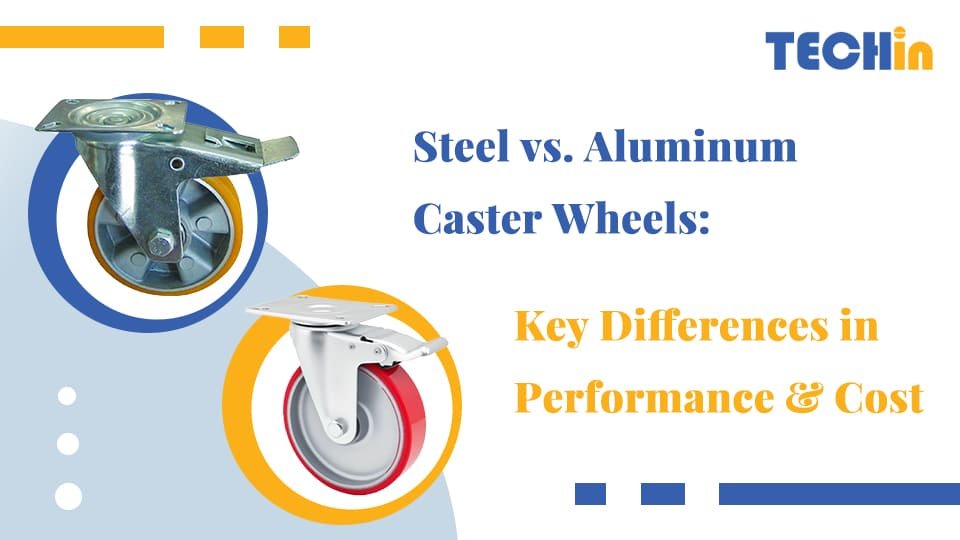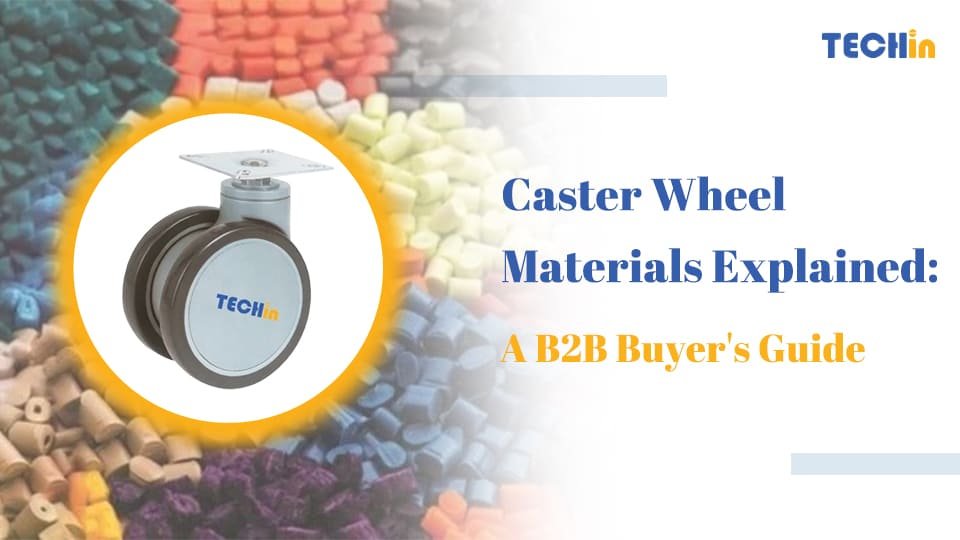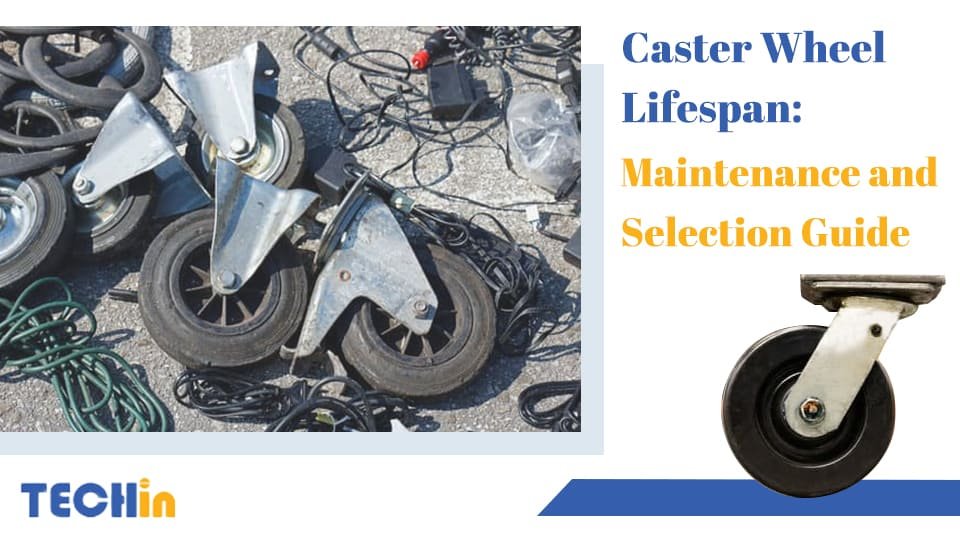Are you looking for the best outdoor caster wheels? Choosing the right casters can make a huge difference in the mobility, durability, and efficiency of your equipment. In this guide, I’ll explain the key features of outdoor caster wheels, the best materials for different outdoor conditions, and give you specific recommendations for different applications.
For outdoor use, the best caster wheels should offer durability, shock absorption, ground clearance, and resistance to harsh weather conditions. Polyurethane, rubber, pneumatic, steel, and cast iron casters are excellent choices, each catering to different terrains and load capacities. Consider the environment and application needs to select the ideal caster type.
Choosing the right caster wheels is critical for smooth outdoor operations. Let’s look at what makes outdoor caster wheels work well.
Characteristics of Effective Caster Wheels
Agility:
A small turning circle and the ability to change direction quickly are essential for many outdoor applications. Swiveling casters enhance maneuverability, making it easier to navigate tight spaces.
Mobility:
Casters must enable carts, gurneys, and other conveyances to move quickly. This is crucial for time-sensitive tasks such as transporting supplies across a campus or moving emergency equipment.
Stability:
In some situations, casters need to stay in place most of the time but still allow movement when necessary. This balance is important for furniture or equipment that requires occasional repositioning.
Ground Clearance:
Ground clearance is vital for navigating rough or uneven terrain. Casters that sit too low can get caught on obstacles, causing damage or impeding movement.
Durability:
Outdoor environments are harsher than indoor settings, so casters must withstand wear and tear. Durable materials minimize the need for frequent replacements and repairs.
Shock Absorption:
Casters should absorb shocks to protect the load and reduce vibrations, especially on uneven surfaces.
Quiet Operation:
For noise-sensitive areas like hospitals or schools, casters should operate quietly to avoid disturbances.
| Characteristic | Description |
|---|---|
| Agility | Small turning circle, quick direction change |
| Mobility | Enables quick movement for time-sensitive tasks |
| Stability | Maintains position, allows movement when needed |
| Ground Clearance | Navigates rough or uneven terrain |
| Durability | Withstands harsh outdoor conditions |
| Shock Absorption | Reduces vibrations on uneven surfaces |
| Quiet Operation | Minimizes noise in sensitive areas |
Types of Caster Wheels for Outdoor Use
Polyurethane Wheels:
Polyurethane wheels combine the resilience of plastic with the elasticity of rubber, offering a versatile solution for outdoor mobility. They roll smoothly and resist wear, so they’re great for all kinds of outdoor applications.
Rubber Wheels:
Rubber casters offer a balance of durability, quiet operation, and floor protection. They are suitable for both indoor and outdoor use, providing shock absorption and smooth movement over rough surfaces.
Pneumatic Wheels:
Air-filled wheels provide excellent cushioning against impacts and rough terrain. They are ideal for soft surfaces like grass or gravel but require maintenance to prevent punctures.
Steel Wheels:
Steel wheels are incredibly durable and can handle substantial weights. They are perfect for extreme heavy-duty applications but require regular maintenance to prevent rusting.
Cast Iron Wheels:
Cast iron wheels are known for their durability and resistance to wear. They are designed to handle heavy loads and thrive in harsh outdoor environments, but they aren’t the best for uneven surfaces.
| Type | Key Features |
|---|---|
| Polyurethane Wheels | Resilient, smooth rolling, wear-resistant |
| Rubber Wheels | Durable, quiet, shock-absorbing |
| Pneumatic Wheels | Cushioned, air-filled, impact-resistant |
| Steel Wheels | Extremely durable, handles heavy loads |
| Cast Iron Wheels | Durable, wear-resistant, handles heavy loads |
Key Applications of Outdoor Caster Wheels
Emergency Medical Services:
Outdoor casters are critical in emergency medical services. For example, gurneys and stretchers used outside need casters that can handle rough terrain and provide smooth, stable movement. Pneumatic and rubber wheels are often used because they absorb shock and roll smoothly.
Catering and Event Services:
Outdoor events like weddings, festivals, and corporate events require moving heavy equipment, furniture, and supplies across all kinds of terrain. Rubber and polyurethane wheels are perfect for these applications because they’re durable and easy to maneuver on both grass and concrete.
Industrial and Construction Sites:
In industrial and construction settings, casters need to handle heavy loads and rough surfaces. Steel and cast iron wheels are often used because they’re strong and durable, allowing you to move equipment efficiently and safely across challenging outdoor environments.
Agriculture and Landscaping:
In agriculture and landscaping, you often need to move equipment and supplies over soft and uneven terrain. Pneumatic wheels work great in these situations because they give you the ground clearance and shock absorption you need to get across fields, gardens, and other outdoor areas.
Recreational and Sports Facilities:
Outdoor sports facilities and recreational areas use casters to move equipment like bleachers, goals, and storage units. Rubber and polyurethane wheels are popular because they roll smoothly over all kinds of surfaces and protect the ground from damage.
| Application | Recommended Wheel Types |
|---|---|
| Emergency Medical Services | Pneumatic, Rubber |
| Catering and Event Services | Rubber, Polyurethane |
| Industrial and Construction Sites | Steel, Cast Iron |
| Agriculture and Landscaping | Pneumatic |
| Recreational and Sports Facilities | Rubber, Polyurethane |
Choosing the Right Caster Wheels
When selecting caster wheels for outdoor use, consider the following factors:
Load Capacity:
Ensure the caster can support the weight of the load with a safety margin to avoid overloading. The maximum weight rating should exceed your requirements for optimal performance and safety.
Terrain:
Select a wheel material that can handle the typical outdoor surfaces, whether smooth concrete, rough asphalt, or soft ground. The wheel’s design and tread pattern should provide adequate traction and stability for the specific terrain.
Weather Resistance:
Casters should resist corrosion and damage from exposure to moisture, temperature extremes, and UV rays. Consider materials that offer weatherproofing to extend the lifespan of the casters.
Swivel Radius:
For tight spaces, swivel casters provide better maneuverability. Fixed casters are better for straight-line movement. The choice between swivel and fixed casters depends on the specific application and required maneuverability.
Braking Mechanism:
Casters with brakes offer additional safety on slopes or uneven ground by preventing unwanted movement. Locking mechanisms are essential for maintaining stability when the equipment is stationary.
| Factor | Considerations |
|---|---|
| Load Capacity | Ensure the caster supports the load weight with a safety margin |
| Terrain | Select wheel material based on typical surfaces (smooth concrete, rough asphalt, soft ground) |
| Weather Resistance | Choose weatherproof materials to withstand moisture, temperature extremes, and UV rays |
| Swivel Radius | Swivel casters for tight spaces, fixed casters for straight-line movement |
| Braking Mechanism | Use locking mechanisms for additional safety on slopes or uneven ground |
Maintenance Tips for Outdoor Caster Wheels
Proper maintenance is essential to ensure the longevity and optimal performance of outdoor caster wheels. Here are some tips to keep your casters in top condition:
Regular Cleaning:
Remove dirt, debris, and grime from the casters regularly to prevent buildup that can impede movement and cause wear. Use a brush and mild detergent to clean the wheels and caster assembly.
Lubrication:
Apply lubricant to the swivel bearings and wheel axles to ensure smooth operation. Use a lubricant suitable for the environmental conditions the casters will encounter.
Inspection:
Regularly inspect the casters for signs of wear, damage, or corrosion. Check the wheels, bearings, and mounting hardware for any issues that could affect performance.
Replacement:
Replace worn or damaged casters promptly to avoid accidents and maintain efficiency. Keep spare casters on hand for quick replacements when needed.
| Maintenance Task | Tips |
|---|---|
| Regular Cleaning | Remove dirt and debris regularly with a brush and mild detergent |
| Lubrication | Apply suitable lubricant to swivel bearings and wheel axles |
| Inspection | Regularly check for signs of wear, damage, or corrosion |
| Replacement | Promptly replace worn or damaged casters, and keep spare casters available for quick replacements |
Summary
Choosing the right caster wheels for outdoor use involves considering factors like load capacity, terrain, and weather resistance. By selecting the right type and material, you can make sure your outdoor equipment performs well and lasts a long time. If you need help or want to see a wide selection of quality casters, please contact us. We’d be happy to help you.
Sources:

